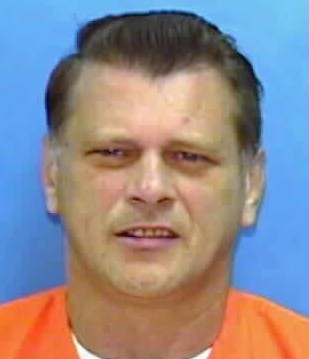AKA: Paul Brock
DC #041482
DOB: 01/10/47
Thirteenth Judicial Circuit,
Hillsborough County, Case #73-1398
Sentencing Judge: The
Honorable Robert W. Rawlins
Trial Attorney: Tom Meyers –
Assistant Public Defender
Attorney, Direct Appeal:
Richard W. Seymour – Assistant Public Defender
Attorney, Collateral
Appeals: William Sheppard – Private
Date of Offense: 06/17/73
Date of Sentence: 04/09/74
Circumstance of Offense:
On June 18, 1973, investigators of the Hillsborough County Sheriff’s
Office responded to a residence in reference to a triple homicide.
Three victims were discovered at the scene, Victim I: Georgia Tully
(age 53), Victim II: Ann Herrman (age 36, victim I’s daughter),
Victim III: Lynne Herrman (age 18, victim II’s daughter).
The body of Georgia Tully
was found in the back bedroom of the house, the body of her daughter
Ann was located in a hallway between the living room and kitchen.
The body of Lynn Herrman was discovered in the kitchen.
Pathology
reports indicate that all three women died from asphyxia due to
strangulation with a nylon cord. The pathologist discovered sperm in
the vaginal tract of Lynn Herrman indicating recent sexual
intercourse. The time of death for the victims was estimated to have
occurred between 11:00 a.m. Saturday June 16, 1973 and 1:30 p.m.
Monday, June 18, 1973.
Investigators suspected an individual known as Paul Brock and, after
attempting to locate the suspect, discovered that the suspect had
left town with his girlfriend and her son.
On June 25, 1973, Paul Brock’s girlfriend contacted the Hillsborough
County Sheriff’s Office and wanted to make a statement. She related
to investigators that her boyfriend, Paul Brock, had admitted that
his real name was Gary Alvord and confessed to her that he had
murdered the three victims.
Additional Information:
It has been reported that
Gary Alvord has had a long history of documented mental health
problems and a family history of mental illness. In Alvord’s 3.850
Motion, he claimed that his mother was treated and hospitalized off
and on for mental illness, possibly Schizophrenia, throughout her
life. He claimed that she had a breakdown and was subsequently
hospitalized immediately following the birth of her son. This
circumstance, therefore, led mental health practitioners to conclude
the abandonment in Alvord’s infancy exacerbated his mental problems.
It is alleged that Alvord’s
father was abusive to Gary and blamed him for his wife’s breakdown.
Beginning at 11 years of age, Gary Alvord was placed in various
foster homes where it was alleged that the cycle of abuse continued
at the hands of his foster parents.
At age 12, he was placed in
Northville Hospital in Michigan for psychiatric care. Alvord
received numerous mental health evaluations and received a variety
of different psychiatric diagnoses including; Sociopathic
Personality Disorder, Passive Aggressive with underlying
Schizophrenia, and it was noted that his behavior could be described
as psychotic. It is reported that Alvord walked off the premises
numerous times while he was institutionalized.
During these escapes
it was reported that Alvord participated in violent behavior; he
threatened one of his attending physicians, threatened to kill any
officer who tried to apprehend him, and was allegedly involved in a
shooting with his brother-in law.
In 1963 Alvord was transferred to
the Iona State Hospital, which at the time was a maximum-security
hospital for the criminally insane. At Iona, he was diagnosed with
Schizophrenic Reaction, Paranoid Type.
During one of Alvord’s
escapes, he was arrested for the kidnapping and rape of a
ten-year-old girl. It is noted that Alvord admitted his
participation in that crime and confessed his involvement in other
rapes. In 1970, he was tried for that crime but was found not guilty
by reason of insanity.
Alvord attempted to escape
from the hospital again in 1971; however, he was immediately
apprehended. Alvord was later granted leave from the hospital,
despite his classification as a dangerous offender, and did not
return on the scheduled date. Alvord then went to Florida and was on
escape status during the commission of this offense.
Throughout the appellate
process Alvord’s attorneys have alleged that he is not competent to
be executed.
In 1973, during the
defendant’s trial, he was transferred to Florida State Hospital to
determine if he was competent to stand trial. He was determined to
be competent by Dr. Daniel J. Sprehe.
Prior to the signing of the
death warrant Governor Graham ordered a competency hearing pursuant
to Florida Statute 922.07 (Executive Order # 79-53) Governor Graham
appointed three psychiatrists to evaluate Alvord. Alvord’s attorney
filed a motion in Circuit Court for a protective order to prevent
the evaluation from taking place. The order was denied on 08/03/79.
Psychiatrists went to Florida State Prison for the purpose of
evaluating the inmate at which time the inmate under the advice of
counsel refused to participate in the evaluation process. The
executive order was subsequently dissolved on 01/09/80.
After the Governor signed
the second Death Warrant on 11/02/84, he ordered another competency
hearing on 11/20/84. (Executive Order # 84-214) Alvord then filed a
Petition for All Writs to the Florida Supreme Court requesting that
he be evaluated separately from the procedures as set forth in F.S.
922.07. That petition was subsequently denied.
Alvord was found to
be incompetent by the panel of psychiatrists appointed by the
Governor. The Governor then ordered a future examination to be
conducted on September 29, 1987.

